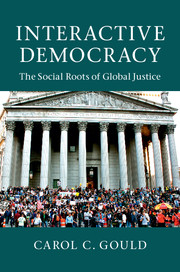Book contents
- Frontmatter
- Dedication
- Contents
- Acknowledgements
- Introduction
- Part I A theoretical framework
- Part II The social roots of global justice
- 5 Transnational solidarities
- 6 Does global justice presuppose global solidarity?
- 7 Recognition and care in global justice
- 8 Gender equality, culture, and the interpretation of human rights
- 9 The sociality of free speech: the case of humor across cultures
- 10 Violence, power-with, and the human right to democracy
- Part III Interactive democracy – transnational, regional, global
- Works cited
- Index
- References
7 - Recognition and care in global justice
Published online by Cambridge University Press: 05 September 2014
- Frontmatter
- Dedication
- Contents
- Acknowledgements
- Introduction
- Part I A theoretical framework
- Part II The social roots of global justice
- 5 Transnational solidarities
- 6 Does global justice presuppose global solidarity?
- 7 Recognition and care in global justice
- 8 Gender equality, culture, and the interpretation of human rights
- 9 The sociality of free speech: the case of humor across cultures
- 10 Violence, power-with, and the human right to democracy
- Part III Interactive democracy – transnational, regional, global
- Works cited
- Index
- References
Summary
Introduction
Two features of social interaction that have been proposed as fundamental bases for the achievement of global justice are the recognition of others (including in their differences) and care for the vulnerable. How do these features function within a political theory of transnational democracy, human rights, and justice across borders? Although some attention has been given to care as a relevant disposition or way of acting, care work in international political economy has most often been neglected by current global justice theories. Caring for others and the labor of care pose for us the question of whether changes are required in our political and social norms to support these forms of relationships and to address any oppressive modes that may attach to them. This chapter considers both the question of the types of recognition required for the extension of equal positive freedom, and the place of care in an account that seeks to highlight network solidarities, along with a social – as well as political – interpretation of human rights.
Recognition and care are not entirely separate phenomena; they are interconnected in various ways, especially in distributive justice contexts. Several theorists have called for the recognition of groups, particularly cultural minorities, within a broad justice framework, while care theorists have argued that we need to go beyond that to attend to individuals’ particular needs and vulnerabilities, counting these vulnerabilities among the relevant differences that should be recognized and supported within contemporary societies. In order to bring care into an account of global justice in this way, however, its political rather than purely interpersonal aspects will need to be analyzed. While I have thus far focused on solidarity, including networks among groups, as relevant for transnational politics, it will be seen that care and recognition have import for dealing with differences in those contexts. Care work too requires analysis, along with the development of new policies for facilitating it and for carrying out the responsibilities it entails. Beyond these issues, the question can be posed whether care itself should be recognized as a human right, in addition to the ones currently acknowledged in morality and law.
- Type
- Chapter
- Information
- Interactive DemocracyThe Social Roots of Global Justice, pp. 132 - 147Publisher: Cambridge University PressPrint publication year: 2014

